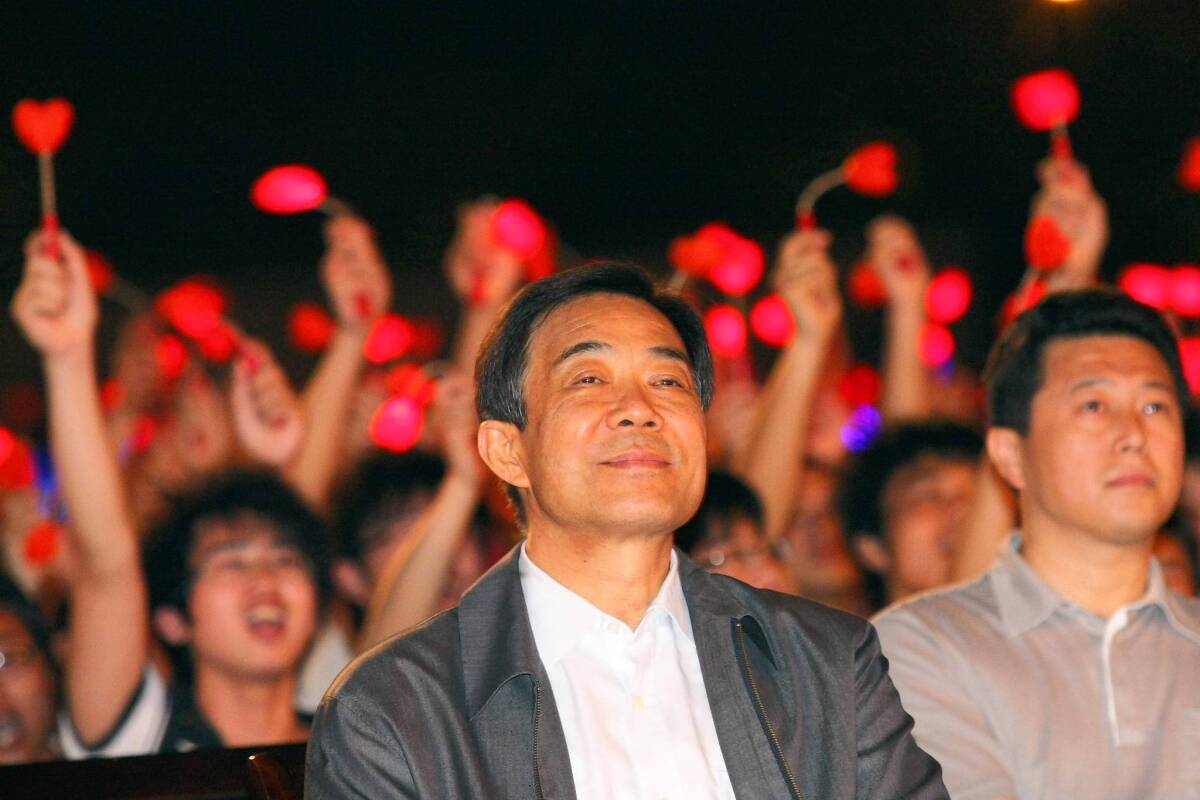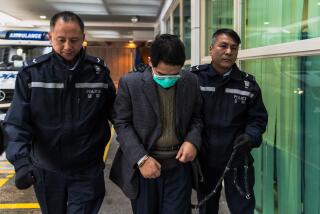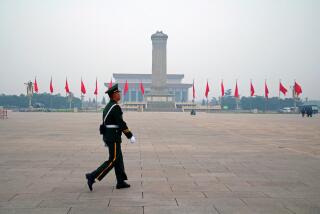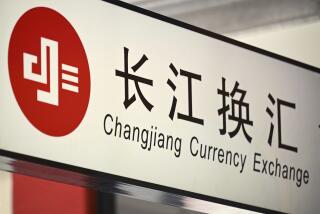Bo Xilai’s wealth on trial in China

BEIJING — It could be China’s most politically charged courtroom drama since the “Gang of Four” including Mao’s wife stood trial in 1980 for orchestrating the Cultural Revolution.
Politics — and murder — are in the picture, but they will form part of the background this time. People familiar with the case say it will be mostly about money. And that amounts to something of a gamble for the Communist leadership.
Once a contender for the uppermost echelon of the Communist Party leadership, Bo Xilai was purged prior to the party congress last year where his rival, Xi Jinping, became China’s leader. His spectacular downfall followed a strange murder case in which his wife was found guilty of poisoning a British businessman.
In his own trial likely to start soon, the 64-year-old Bo stands accused of abusing his public position to grow indecently rich. People familiar with the details say it will mostly skirt the murder case, although it is alleged that the businessman, Neil Heywood, had helped the Bo family funnel money out of China.
“This will be all about economic crimes,” said Shen Zhigeng, a lawyer who has represented the family of Bo’s wife, Gu Kailai.
Through proxies, Bo and his wife are said to have owned a $3.5-million villa in Cannes, luxury apartments in London as well as a condominium in Cambridge, Mass., where their son had attended Harvard’s Kennedy School.
The problem for China’s leaders, their critics point out, is that in some ways they’re not so different from Bo. Many of them are equally well off or have families who have grown rich under the system — and just as intent on placing their children in elite schools outside China.
Bo was actually less obsessed with money than many other politicians are, said a Taiwanese businessman who knows the family well. “He was into power and women. Money was always second,” said the businessman, who spoke on condition of anonymity.
The Chinese government nevertheless wants to use Bo as an example in its campaign against official corruption.
In announcing his indictment last month, the official New China News Agency said “Bo took the advantage of his position as a civil servant to seek gains for others, as well as accepted bribes in the form of large amounts of money and property.” It said he also embezzled public money and abused his power.
The charges date back to the 1990s, when Bo served as mayor and later party secretary of Dalian, a port city of 6 million people. He cultivated a close relationship with a young businessman, Xu Ming, and together their fortunes soared. The owner of a small seafood refrigeration warehouse, Xu was awarded no-bid contracts for redevelopment projects that transformed Dalian into an urban showcase.
Just 21 when Bo came to Dalian, Xu became a billionaire within a few years. At one point, according to Forbes, he was the eighth-richest man in China. He showed his appreciation by showering the Bo family with his largess.
Xu allegedly flew the family on first-class trips to Europe and paid for Bo’s son to attend the $40,000-a-year Harrow boarding school in London. He hired a law firm run by Gu. He is also suspected of buying various properties for the Bo family, including the stunning villa in Cannes.
“It was a typical relationship between a politician and a businessman — they traded power and money,” said Jiang Weiping, a Chinese journalist who was imprisoned after reporting on corruption in Dalian.
The most eye-catching example in the trial is likely to be the villa perched on a leafy hillside overlooking the Mediterranean. It was purchased in 2001 by Residences Fontaine St. Georges, according to French court records uncovered by the Wall Street Journal. Records show that the director of the company was initially Patrick Devillers, a Frenchman who had lived in Dalian, but that management was transferred to Heywood in 2007.
During Gu’s trial last year, prosecutors charged that she murdered Heywood because he was demanding $22 million for a “real estate project in France” and another development in Chongqing, where Bo was party leader until he was purged.
The year before Heywood’s death, management of the villa was transferred to television hostess Feng Jiang Dolby. Photographs posted on her personal blog, which have since been deleted, show a three-story home surrounded by crenelated white walls with a sparkling swimming pool bordered by shrubbery.
Bo and Gu rarely — if ever — visited the villa, which was rented out as a vacation home to wealthy foreigners, often Russians.
“They were very busy people. They sometimes went to the U.K. or the U.S. or maybe Singapore, but they didn’t have time to travel around France,” said Larry Cheng, a retired businessman who was Gu’s law partner in Dalian.
Cheng said he knew Gu had traveled to Paris, but was not aware of any trips to the French Riviera.
Bo’s upcoming trial is a gamble for the Chinese government, given that many Communist Party leaders are wealthy. Last year, an obscure bureaucrat from the southern city of Guangzhou earned the nickname “Uncle House” after it was revealed that he had acquired 22 homes worth $6 million. The New York Times reported last year that the family of then-Premier Wen Jiabao was worth $2.7 billion.
“This is a common problem among Chinese officials,” opined an unsigned editorial in Duowei, an overseas Chinese website linked to the Chinese Communist Party.
The editorial noted that much of the money Bo and Gu are alleged to have obtained illegally went to support the overseas education of their son Guagua, and that many of the current leaders also have offspring studying abroad.
“If you have to trace where all the money came from and go after each individual involved, it might shake and bring fear to the whole class of senior officials,” it said. The editorial has since been deleted from the website.
A telegenic self-promoter who spoke passable English, Bo was widely lauded in China and abroad. Former Secretary of State Henry Kissinger visited him in Chongqing in 2011.
In Dalian, he was credited with turning around the economy, developing parks and museums, and creating an equestrian police troop of attractive young women. In Chongqing, he endeared himself to many older Chinese with a Maoist revival that encouraged people to sing “red songs” and embrace Communist values.
Bo is not expected to have his own lawyer at the trial. Gu Yushu, an attorney hired by his family, has not been given permission to appear in court, which will leave Bo to be represented by state-appointed attorneys.
Unlike the Gang of Four trial, which was nationally televised, Bo’s is expected to be a closed-door affair. The government has said only that it would take place in Jinan, the capital of Shandong province, but has not given a date.
Most of the testimony is likely to be in the form of written statements. The Frenchman Devillers, who now lives in Cambodia, was given immunity in return for a prepared statement that he handled money for Gu Kailai, according to the Cambodian government. The tycoon Xu disappeared without explanation from public view more than a year ago. He is widely rumored to have killed himself in prison.
“We are not sure that there will be any live witnesses at this trial,” said Li Xiaolin, a Beijing lawyer who had been hired to represent a Gu codefendant in the murder trial last year.
Li predicted that the trial would last no more than two days, with the outcome preordained. In China, 98% of people put on trial are convicted. “This is how trials are conducted in China, and we don’t think this one will be any different,” he said.
Last week, the government detained journalist Song Yangbiao, who had called for Bo’s followers to attend the trial in a show of support. Over the last year, other activists have been arrested after calling for legislation that would require government officials to disclose their assets.
Although not as prominent as Bo, other Politburo members have stood trial for corruption since 1995 — Beijing Mayor Chen Xitong and former Shanghai party secretary Chen Liangyu.
Lawyers say that prosecutors have been trying to reach a deal in which Bo would receive a maximum 20-year sentence along with assurances that his son would not be harmed. Bo’s wife received a suspended death sentence last year after appearing contrite and subdued in court, confessing and apologizing.
Bo may not be so cooperative. He gave a defiant news conference last year, days before his ouster, lambasting critics who “pour filth on me and my family,” and is rumored to have gone on a hunger strike in prison.
“He will not let go of this last appearance on stage. He will wear a tie in court and do plenty of talking,” predicted Jiang, the journalist. That might be one reason the trial has taken so long to get started.
More to Read
Start your day right
Sign up for Essential California for news, features and recommendations from the L.A. Times and beyond in your inbox six days a week.
You may occasionally receive promotional content from the Los Angeles Times.






